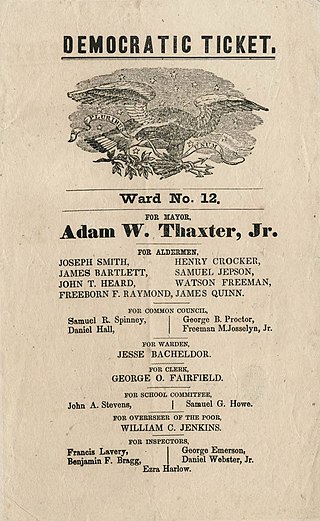
Samuel Turell Armstrong was a U.S. political figure. Born in 1784 in Dorchester, Massachusetts, he was a printer and bookseller in Boston, specializing in religious materials. Among his works were an early stereotype edition of Scott's Family Bible, which was very popular, and The Panoplist, a religious magazine devoted to missionary interests.
The Boston mayoral election of 1854 saw the reelection of incumbent mayor Jerome V. C. Smith. It was held on December 11, 1854.
The Boston mayoral election of 1855 saw the election of Alexander H. Rice. It was held on December 10, 1855.
The Boston mayoral election of 1859 saw the reelection of Frederic W. Lincoln Jr. to a third consecutive term. It was held on December 12, 1859.
The 1863 Boston mayoral election was held on December 14, 1863 and saw Frederic W. Lincoln Jr. reelected to a fifth overall term.
The Boston mayoral election of 1874 saw the reelection of Samuel C. Cobb.

Isaac R. Harrington was a prominent businessman and entrepreneur in Burlington, Vermont and Buffalo, New York. He became active in politics as a Whig and served as mayor of Buffalo from 1841 to 1842.
The Boston mayoral election of 1853–1854 saw the election of Citizens Union Party nominee Jerome V. C. Smith. The election took three votes, as no candidate secured the needed majority in the first two attempts. Incumbent Whig mayor Benjamin Seaver had run for reelection as his party's nominee in the first vote, but opted not to compete in the second or third votes.

The 1851 Boston mayoral election saw the election of Benjamin Seaver, a former president of the Boston Common Council, as mayor of Boston. The election took three votes, as no candidate secured the needed majority in the first two attempts. In the third attempt, Seaver won the required majority by the margin of a single vote. Incumbent Whig mayor John P. Bigelow was not a nominee for reelection.
The 1850 Boston mayoral election saw the reelection of incumbent Whig mayor John P. Bigelow to a third consecutive term. It was held on December 9, 1850.
The 1848 Boston mayoral election saw the election of Whig Party nominee John P. Bigelow. It was held on December 11, 1848. Incumbent Whig mayor Josiah Quincy Jr. was not a nominee for reelection.
The December 1845 Boston mayoral election saw the election of Whig Party nominee Josiah Quincy Jr. It was held on December 8, 1845.
The 1844–45 Boston mayoral election saw the election of Native American Party nominee Thomas Aspinwall Davis as mayor of Boston. The election took eight votes, as no candidate secured the needed majority in the first seven attempts. Incumbent Whig Party mayor Martin Brimmer was not a nominee reelection.
The 1842 Boston mayoral election saw the election of Whig Party nominee Martin Brimmer. It was held on December 12, 1842. Whig Party incumbent Jonathan Chapman was not a nominee for reelection.
The 1840 Boston mayoral election saw the reelection of Whig Party incumbent Jonathan Chapman. It was held on December 14, 1840.
The 1839 Boston mayoral election saw the election of Whig Party nominee Jonathan Chapman. It was held on December 9, 1839. Whig Party incumbent Samuel Atkins Eliot was not a nominee for reelection.
The 1838 Boston mayoral election saw the reelection of Whig Party incumbent Samuel Atkins Eliot to a third consecutive term. It was held on December 10, 1838.
The 1837 Boston mayoral election saw the reelection of Whig Party incumbent Samuel Atkins Eliot. It was held on December 11, 1837.
The 1836 Boston mayoral election saw the election of Whig Party nominee Samuel Atkins Eliot. It was held on December 12, 1836. Incumbent Samuel T. Armstrong was not a nominee for reelection.
The 1834 Boston mayoral election saw the election of incumbent Theodore Lyman II. It was held on December 8, 1834.





